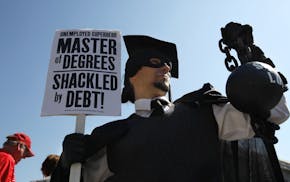Clearly, Dan Boivin does not understand the role of a lap dog.
Rule No. 1: Don't bite the hand that feeds you.
Boivin is the chairman of the Metropolitan Airports Commission. Last week the agency released a report showing that Minnesotans generally pay higher average airfares than people who fly from other major airports.
No surprise there. At least a half-dozen studies over the past two decades also have concluded that minimal competition allowed Northwest Airlines, and later Delta, to charge higher prices here.
But none of those studies was ever commissioned by the MAC, which generally has gone out of its way not to offend the airport's biggest paying tenant.
Boivin insists that MAC's relationship with Delta remains strong, "but I've made it clear that we'd like to continue to grow air service, and one complaint we hear is the price of air travel."
Even saying that aloud suggests that things are different now.
One of Boivin's predecessors, Vicki Tigwell, the MAC chair from 2003 through 2006, flatly said she didn't believe studies that found higher prices at MSP. Mostly, though, MAC leaders avoided having to comment directly on those studies.
And I don't fault them. Apart from actual competition, few things provoked the fury of Northwest executives as much as the suggestion that it overcharged customers. I experienced this as an editor on a 2005 project that questioned the wisdom of the MAC's support of Northwest's $900 million airport expansion plan. The project included two fare studies that the Star Tribune commissioned.
Northwest's response? Imagine a conference room full of those flying, screaming monkeys from "The Wizard of Oz."
Boivin has been on the commission since 2002, and he sparred frequently with MAC staff and Northwest officials over noise insulation programs and efforts to recruit more airlines. Gov. Mark Dayton appointed him chairman last year.
Still, he encountered no screaming monkeys when he asked the staff and a consultant to analyze fares at MSP. Delta has generally been much more tempered in its response to these studies, even declining to comment on a government study released during the summer.
"They've said they don't mind any competition," Boivin said. "And they know where I stand."
Even if the new study tells us something we already knew, the findings do provide a small window into how much bankruptcies and mergers have reshaped the airline industry and, paradoxically, helped introduce more competition -- even at so-called fortress hubs, like MSP.
Last year, for example, airlines other than Delta, United and American -- those relegated mostly to Terminal 2 -- carried 10 percent of all passengers at MSP, up from 7 percent in 2005.
Through October of this year, the number of people flying on Southwest, AirTran, Sun Country and other low-fare carriers is up more than 13 percent, while passenger volumes on the major carriers are flat.
Airfares out of the Twin Cities remain high. The most recent government study, released in August, ranked MSP 11th among the nation's largest airports in airfares in the first quarter of this year, with a $413 average ticket price for domestic flights.
But in 2008 we ranked sixth, and you have to wonder if the increased competition is responsible for that change. The MAC analysis, after all, found that the average one-way fare from MSP was $59 cheaper if the route was also served by a low-fare competitor.
Lower fares are generally great news for consumers and airports because, as fares fall, more people travel.
But it's not necessarily good news for all.
Carriers like Southwest are interested in the most popular destinations. If Delta's pricing power on those routes weakens, it might turn around and raise prices on nonstop routes that it has to itself, such as MSP to Saskatoon.
Other destinations might fall off the route map altogether, or see reduced service in the form of fewer flights or smaller planes.
That's already happening at MSP. Last year, more than a quarter of passengers arrived or departed on aircraft with 70 or fewer seats, vs. 12 percent in 2005.
Delta's increasing reliance on smaller planes, coupled with other recent events, has left some officials feeling anxious about the airline's commitment to the Twin Cities as a major hub.
In the summer, Delta, which paid $3 billion to acquire Northwest in 2008, said it will stop flying to some smaller cities, such as International Falls, and announced plans to move 400 more jobs out of the state.
In October, Delta said it would pay off a state loan early, which frees it from the obligation of having at least 10,000 employees in Minnesota. (Context: In 2001, Northwest had more than 21,000 Minnesota workers.)
Like his predecessors, Boivin believes that Delta's presence is key to the region's vitality. "Cities like Cleveland and Cincinnati would kill to have the kind of air service we have," he said.
And Boivin's not too worried about losing it. Thanks in part to the higher prices Delta can charge at MSP, "we're a very profitable hub for them," he said.
ericw@startribune.com • 612-673-1736

Wieffering: Time to get over debit card fees
For Thrivent and others, warnings were there

With billions in sales, some co-ops are big business
